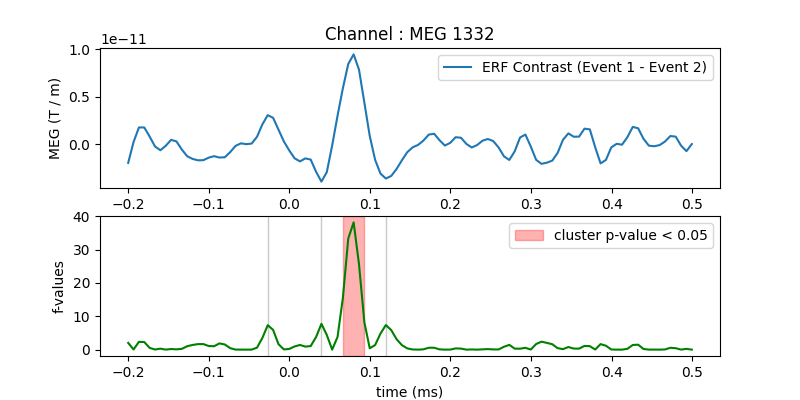Note
Go to the end to download the full example code.
Permutation F-test on sensor data with 1D cluster level#
One tests if the evoked response is significantly different between conditions. Multiple comparison problem is addressed with cluster level permutation test.
# Authors: Alexandre Gramfort <alexandre.gramfort@inria.fr>
#
# License: BSD-3-Clause
# Copyright the MNE-Python contributors.
import matplotlib.pyplot as plt
import mne
from mne import io
from mne.datasets import sample
from mne.stats import permutation_cluster_test
print(__doc__)
Set parameters
data_path = sample.data_path()
meg_path = data_path / "MEG" / "sample"
raw_fname = meg_path / "sample_audvis_filt-0-40_raw.fif"
event_fname = meg_path / "sample_audvis_filt-0-40_raw-eve.fif"
tmin = -0.2
tmax = 0.5
# Setup for reading the raw data
raw = io.read_raw_fif(raw_fname)
events = mne.read_events(event_fname)
channel = "MEG 1332" # include only this channel in analysis
include = [channel]
Opening raw data file /home/circleci/mne_data/MNE-sample-data/MEG/sample/sample_audvis_filt-0-40_raw.fif...
Read a total of 4 projection items:
PCA-v1 (1 x 102) idle
PCA-v2 (1 x 102) idle
PCA-v3 (1 x 102) idle
Average EEG reference (1 x 60) idle
Range : 6450 ... 48149 = 42.956 ... 320.665 secs
Ready.
Read epochs for the channel of interest
picks = mne.pick_types(raw.info, meg=False, eog=True, include=include, exclude="bads")
event_id = 1
reject = dict(grad=4000e-13, eog=150e-6)
epochs1 = mne.Epochs(
raw, events, event_id, tmin, tmax, picks=picks, baseline=(None, 0), reject=reject
)
condition1 = epochs1.get_data() # as 3D matrix
event_id = 2
epochs2 = mne.Epochs(
raw, events, event_id, tmin, tmax, picks=picks, baseline=(None, 0), reject=reject
)
condition2 = epochs2.get_data() # as 3D matrix
condition1 = condition1[:, 0, :] # take only one channel to get a 2D array
condition2 = condition2[:, 0, :] # take only one channel to get a 2D array
Not setting metadata
72 matching events found
Setting baseline interval to [-0.19979521315838786, 0.0] s
Applying baseline correction (mode: mean)
0 projection items activated
Loading data for 72 events and 106 original time points ...
Rejecting epoch based on EOG : ['EOG 061']
Rejecting epoch based on EOG : ['EOG 061']
Rejecting epoch based on EOG : ['EOG 061']
Rejecting epoch based on EOG : ['EOG 061']
Rejecting epoch based on EOG : ['EOG 061']
Rejecting epoch based on EOG : ['EOG 061']
Rejecting epoch based on EOG : ['EOG 061']
Rejecting epoch based on EOG : ['EOG 061']
Rejecting epoch based on EOG : ['EOG 061']
Rejecting epoch based on EOG : ['EOG 061']
Rejecting epoch based on EOG : ['EOG 061']
Rejecting epoch based on EOG : ['EOG 061']
Rejecting epoch based on EOG : ['EOG 061']
Rejecting epoch based on EOG : ['EOG 061']
Rejecting epoch based on EOG : ['EOG 061']
Rejecting epoch based on EOG : ['EOG 061']
16 bad epochs dropped
Not setting metadata
73 matching events found
Setting baseline interval to [-0.19979521315838786, 0.0] s
Applying baseline correction (mode: mean)
0 projection items activated
Loading data for 73 events and 106 original time points ...
Rejecting epoch based on EOG : ['EOG 061']
Rejecting epoch based on EOG : ['EOG 061']
Rejecting epoch based on EOG : ['EOG 061']
Rejecting epoch based on EOG : ['EOG 061']
Rejecting epoch based on EOG : ['EOG 061']
Rejecting epoch based on EOG : ['EOG 061']
Rejecting epoch based on EOG : ['EOG 061']
Rejecting epoch based on EOG : ['EOG 061']
Rejecting epoch based on EOG : ['EOG 061']
Rejecting epoch based on EOG : ['EOG 061']
Rejecting epoch based on EOG : ['EOG 061']
11 bad epochs dropped
Compute statistic
threshold = 6.0
T_obs, clusters, cluster_p_values, H0 = permutation_cluster_test(
[condition1, condition2],
n_permutations=1000,
threshold=threshold,
tail=1,
n_jobs=None,
out_type="mask",
)
stat_fun(H1): min=0.00022698366437456956 max=38.16709257110227
Running initial clustering …
Found 4 clusters
0%| | Permuting : 0/999 [00:00<?, ?it/s]
16%|█▌ | Permuting : 156/999 [00:00<00:00, 4288.43it/s]
29%|██▉ | Permuting : 292/999 [00:00<00:00, 4154.48it/s]
44%|████▍ | Permuting : 439/999 [00:00<00:00, 4220.76it/s]
58%|█████▊ | Permuting : 577/999 [00:00<00:00, 4188.60it/s]
69%|██████▉ | Permuting : 693/999 [00:00<00:00, 4026.13it/s]
83%|████████▎ | Permuting : 829/999 [00:00<00:00, 4028.12it/s]
97%|█████████▋| Permuting : 972/999 [00:00<00:00, 4062.00it/s]
100%|██████████| Permuting : 999/999 [00:00<00:00, 4082.52it/s]
Plot
times = epochs1.times
fig, (ax, ax2) = plt.subplots(2, 1, figsize=(8, 4))
ax.set_title("Channel : " + channel)
ax.plot(
times,
condition1.mean(axis=0) - condition2.mean(axis=0),
label="ERF Contrast (Event 1 - Event 2)",
)
ax.set_ylabel("MEG (T / m)")
ax.legend()
for i_c, c in enumerate(clusters):
c = c[0]
if cluster_p_values[i_c] <= 0.05:
h = ax2.axvspan(times[c.start], times[c.stop - 1], color="r", alpha=0.3)
else:
ax2.axvspan(times[c.start], times[c.stop - 1], color=(0.3, 0.3, 0.3), alpha=0.3)
hf = plt.plot(times, T_obs, "g")
ax2.legend((h,), ("cluster p-value < 0.05",))
ax2.set_xlabel("time (ms)")
ax2.set_ylabel("f-values")

Total running time of the script: (0 minutes 1.058 seconds)